- Home
- Michael Swanwick
Tales of Old Earth Page 2
Tales of Old Earth Read online
Page 2
“Damn, damn, damn,” she muttered. On the one hand, this was a dangerous place to stay in. On the other, she’d been awake almost twenty hours now and she was dead on her feet. Exhausted. So very, very tired.
“O sleep! It is a gentle thing. Beloved from pole to pole. Coleridge.”
Which, God knows, was tempting. But the numbers were clear: no sleep. With several deft chin-taps, Martha overrode her suit’s safeties and accessed its medical kit. At her command, it sent a hit of methamphetamine rushing down the drug/vitamin catheter.
There was a sudden explosion of clarity in her skull and her heart began pounding like a motherfucker. Yeah. That did it. She was full of energy now. Deep breath. Long stride. Let’s go.
No rest for the wicked. She had things to do. She left the flowers rapidly behind. Good-bye, Oz.
Fade out. Fade in. Hours had glided by. She was walking through a shadowy sculpture garden. Volcanic pillars (these were their second great discovery; they had no exact parallel on Earth) were scattered across the pyroclastic plain like so many isolated Lipschitz statues. They were all rounded and heaped, very much in the style of rapidly cooled magma. Martha remembered that Burton was dead, and cried quietly to herself for a few minutes.
Weeping, she passed through the eerie stone forms. The speed made them shift and move in her vision. As if they were dancing. They looked like women to her, tragic figures out of The Bacchae or, no, wait, The Trojan Women was the play she was thinking of. Desolate. Filled with anguish. Lonely as Lot’s wife.
There was a light scattering of sulfur dioxide snow on the ground here. It sublimed at the touch of her boots, turning to white mist and scattering wildly, the steam disappearing with each stride and then being renewed with the next footfall. Which only made the experience all that much creepier.
Click.
“Io has a metallic core predominantly of iron and iron sulfide, overlain by a mantle of partially molten rock and crust.”
“Are you still here?”
“Am trying. To communicate.”
“Shut up.”
She topped the ridge. The plains ahead were smooth and undulating. They reminded her of the Moon, in the transitional region between Mare Serenitatis and the foothills of the Caucasus Mountains, where she had undergone her surface training. Only without the impact craters. No impact craters on Io. Least cratered solid body in the Solar System. All that volcanic activity deposited a new surface one meter thick every millenium or so. The whole damned moon was being constantly repaved.
Her mind was rambling. She checked her gauges, and muttered, “Let’s get this show on the road.”
There was no reply.
Dawn would come—when? Let’s work this out. Io’s “year,” the time it took to revolve about Jupiter, was roughly forty-two hours fifteen minutes. She’d been walking seven hours. During which Io would’ve moved roughly sixty degrees through its orbit. So it would be dawn soon. That would make Daedalus’s plume less obvious, but with her helmet graphics that wouldn’t be a worry. Martha swiveled her neck, making sure that Daedalus and Jupiter were where they ought to be, and kept on walking.
Trudge, trudge, trudge. Try not to throw the map up on the visor every five minutes. Hold off as long as you can, just one more hour, okay, that’s good, and another two miles. Not too shabby.
The sun was getting high. It would be noon in another hour and a half. Which meant—well, it really didn’t mean much of anything.
Rock up ahead. Probably a silicate. It was a solitary six meters high brought here by who knew what forces and waiting who knew how many thousands of years just for her to come along and need a place to rest. She found a flat spot where she could lean against it and, breathing heavily, sat down to rest. And think. And check the airpack. Four hours until she had to change it again. Bringing her down to two air-packs. She had slightly under twenty-four hours now. Thirty-five miles to go. That was less than two miles an hour. A snap. Might run a little tight on oxygen there toward the end, though. She’d have to take care she didn’t fall asleep.
Oh, how her body ached.
It ached almost as much as it had in the ‘48 Olympics, when she’d taken the bronze in the women’s marathon. Or that time in the internationals in Kenya she’d come up from behind to tie for second. Story of her life. Always in third place, fighting for second. Always flight crew and sometimes, maybe, landing crew, but never the commander. Never class president. Never king of the hill. Just once—once!—she wanted to be Neil Armstrong.
Click.
“The marble index of a mind forever. Voyaging through strange seas of thought, alone. Wordsworth.”
“What?”
“Jupiter’s magnetosphere is the largest thing in the solar system. If the human eye could see it, it would appear two and a half times wider in the sky than the sun does.”
“I knew that,” she said, irrationally annoyed.
“Quotation is. Easy. Speech is. Not.”
“Don’t speak, then.”
“Trying. To communicate!”
She shrugged. “So go ahead—communicate.”
Silence. Then, “What does. This. Sound like?”
“What does what sound like?”
“Io is a sulfur-rich, iron-cored moon in a circular orbit around Jupiter. What does this. Sound like? Tidal forces from Jupiter and Ganymede pull and squeeze Io sufficiently to melt Tartarus, its subsurface sulfur ocean. Tartarus vents its excess energy with sulfur and sulfur dioxide volcanoes. What does. This sound like? Io’s metallic core generates a magnetic field which punches a hole in Jupiter’s magnetosphere, and also creates a high-energy ion flux tube connecting its own poles with the north and south poles of Jupiter. What. Does this sound like? Io sweeps up and absorbs all the electrons in the million-volt range. Its volcanoes pump out sulfur dioxide; its magnetic field breaks down a percentage of that into sulfur and oxygen ions; and these ions are pumped into the hole punched in the magnetosphere, creating a rotating field commonly called the Io torus. What does this sound like? Torus. Flux tube. Magnetosphere. Volcanoes. Sulfur ions. Molten ocean. Tidal heating. Circular orbit. What does this sound like?”
Against her will, Martha had found herself first listening, then intrigued, and finally involved. It was like a riddle or a word puzzle. There was a right answer to the question. Burton or Hols would have gotten it immediately. Martha had to think it through.
There was the faint hum of the radio’s carrier beam. A patient, waiting noise.
At last, she cautiously said, “It sounds like a machine.”
“Yes. Yes. Yes. Machine. Yes. Am machine. Am machine. Am machine. Yes. Yes. Machine. Yes.”
“Wait. You’re saying that Io is a machine? That you’re a machine? That you’re Io?”
“Sulfur is triboelectric. Sledge picks up charges. Burton’s brain is intact. Language is data. Radio is medium. Am machine.”
“I don’t believe you.”
Trudge, drag, trudge, drag. The world doesn’t stop for strangeness. Just because she’d gone loopy enough to think that Io was alive and a machine and talking to her didn’t mean that Martha could stop walking. She had promises to keep, and miles to go before she slept. And speaking of sleep, it was time for another fast refresher—just a quarterhit—of speed.
Wow. Let’s go.
As she walked, she continued to carry on a dialogue with her hallucination or delusion or whatever it was. It was too boring otherwise.
Boring, and a tiny bit terrifying.
So she asked, “If you’re a machine, then what is your function? Why were you made?”
“To know you. To love you. And to serve you.”
Martha blinked. Then, remembering Burton’s long reminiscences on her Catholic girlhood, she laughed. That was a paraphrase of the answer to the first question in the old Baltimore Catechism: Why did God make man? “If I keep on listening to you, I’m going to come down with delusions of grandeur.”
“You are. Creator. Of machine.”
“Not me.”
She walked on without saying anything for a time. Then, because the silence was beginning to get to her again, “When was it I supposedly created you?”
“So many a million of ages have gone. To the making of man. Alfred, Lord Tennyson.”
“That wasn’t me, then. I’m only twenty-seven. You’re obviously thinking of somebody else.”
“It was. Mobile. Intelligent. Organic. Life. You are. Mobile. Intelligent. Organic. Life.”
Something moved in the distance. Martha looked up, astounded. A horse. Pallid and ghostly white, it galloped soundlessly across the plains, tail and mane flying.
She squeezed her eyes tight and shook her head. When she opened her eyes again, the horse was gone. A hallucination. Like the voice of Burton/Io. She’d been thinking of ordering up another refresher of the meth, but now it seemed best to put it off as long as possible.
This was sad, though. Inflating Burton’s memories until they were as large as Io. Freud would have a few things to say about that. He’d say she was magnifying her friend to a godlike status in order to justify the fact that she’d never been able to compete one-on-one with Burton and win. He’d say she couldn’t deal with the reality that some people were simply better at things than she was.
Trudge, drag, trudge, drag.
So, okay, yes, she had an ego problem. She was an overambitious, self-centered bitch. So what? It had gotten her this far, where a more reasonable attitude would have left her back in the slums of greater Levittown. Making do with an eight-by-ten room with bathroom rights and a job as a dental assistant. Kelp and talapia every night, and rabbit on Sunday. The hell with that. She was alive and Burton wasn’t—by any rational standard that made her the winner.
“Are you. Listening?”
“Not really, no.”
She topped yet another rise. And stopped dead. Down below was a dark expanse of molten sulfur. It stretched, wide and black, across the streaked orange plains. A lake. Her helmet readouts ran a thermal topography from the negative 230°F at her feet to 65°F at the edge of the lava flow. Nice and balmy. The molten sulfur itself, of course, existed at higher ambient temperatures.
It lay dead in her way.
They’d named it Lake Styx.
Martha spent half an hour muttering over her topo maps, trying to figure out how she’d gone so far astray. Not that it wasn’t obvious. All that stumbling around. Little errors that she’d made, adding up. A tendency to favor one leg over the other. It had been an iffy thing from the beginning, trying to navigate by dead reckoning.
Finally, though, it all came together. Here she was. On the shores of Lake Styx. Not all that far off-course after all. Three miles, maybe, tops.
Despair filled her.
They’d named the lake during their first loop through the Galilean system, what the engineers had called the “mapping run.” It was one of the largest features they’d seen that wasn’t already on the maps from satellite probes or Earth-based reconnaissance. Hols had thought it might be a new phenomenon—a lake that had achieved its current size within the past ten years or so. Burton had thought it would be fun to check it out. And Martha hadn’t cared, so long as she wasn’t left behind. So they’d added the lake to their itinerary.
She had been so transparently eager to be in on the first landing, so afraid that she’d be left behind, that when she suggested they match fingers, odd man out, for who stayed, both Burton and Hols had laughed. “I’ll play mother,” Hols had said magnanimously, “for the first landing. Burton for Ganymede and then you for Europa. Fair enough?” And ruffled her hair.
She’d been so relieved, and so grateful, and so humiliated too. It was ironic. Now it looked like Hols—who would never have gotten so far off course as to go down the wrong side of the Styx—wasn’t going to get to touch rock at all. Not this expedition.
“Stupid, stupid, stupid,” Martha muttered, though she didn’t know if she were condemning Hols or Burton or herself. Lake Styx was horseshoe-shaped and twelve miles long. And she was standing right at the inner toe of the horseshoe.
There was no way she could retrace her steps back around the lake and still get to the lander before her air ran out. The lake was dense enough that she could almost swim across it, if it weren’t for the viscosity of the sulfur, which would coat her heat radiators and burn out her suit in no time flat. And the heat of the liquid. And whatever internal flows and undertows it might have. As it was, the experience would be like drowning in molasses. Slow and sticky.
She sat down and began to cry.
After a time she began to build up her nerve to grope for the snap-coupling to her airpack. There was a safety for it, but among those familiar with the rig it was an open secret that if you held the safety down with your thumb and yanked suddenly on the coupling, the whole thing would come undone, emptying the suit in less than a second. The gesture was so distinctive that hot young astronauts-in-training would mime it when one of their number said something particularly stupid. It was called the suicide flick.
There were worse ways of dying.
“Will build. Bridge. Have enough. Fine control of. Physical processes. To build. Bridge.”
“Yeah, right, very nice, you do that,” Martha said absently. If you can’t be polite to your own hallucinations … She didn’t bother finishing the thought. Little crawly things were creeping about on the surface of her skin. Best to ignore them.
“Wait. Here. Rest. Now.”
She said nothing but only sat, not resting. Building up her courage. Thinking about everything and nothing. Clutching her knees and rocking back and forth.
Eventually, without meaning to, she fell asleep.
“Wake. Up. Wake. Up. Wake. Up.”
“Uhh?”
Martha struggled up into awareness. Something was happening before her, out on the lake. Physical processes were at work. Things were moving.
As she watched, the white crust at the edge of the dark lake bulged outward, shooting out crystals, extending. Lacy as a snowflake. Pale as frost. Reaching across the molten blackness. Until there was a narrow white bridge stretching all the way to the far shore.
“You must. Wait,” Io said. “Ten minutes and. You can. Walk across. It. With ease.”
“Son of a bitch,” Martha murmured. “I’m sane.”
In wondering silence, she crossed the bridge that Io had enchanted across the dark lake. Once or twice the surface felt a little mushy underfoot, but it always held.
It was an exalting experience. Like passing over from Death into Life.
At the far side of the Styx, the pyroclastic plains rose gently toward a distant horizon. She stared up yet another long, crystal-flower-covered slope. Two in one day. What were the odds against that?
She struggled upward, flowers exploding as they were touched by her boots. At the top of the rise, the flowers gave way to sulfur hardpan again. Looking back, she could see the path she had crunched through the flowers begin to erase itself. For a long moment she stood still, venting heat. Crystals shattered soundlessly about her in a slowly expanding circle.
She was itching something awful now. Time to freshen up. Six quick taps brought up a message on her visor: Warning: Continued use of this drug at current levels can result in paranoia, psychosis, hallucinations, misperceptions, and hypomania, as well as impaired judgment.
Fuck that noise. Martha dealt herself another hit.
It took a few seconds. Then—whoops. She was feeling light and full of energy again. Best check the airpack reading. Man, that didn’t look good. She had to giggle.
Which was downright scary.
Nothing could have sobered her up faster than that high little druggie laugh. It terrified her. Her life depended on her ability to maintain. She had to keep taking meth to keep going, but she also had to keep going under the drug. She couldn’t let it start calling the shots. Focus. Time to switch over to the last airpack. Burton’s airpack. “I’ve got eight hours of
oxygen left. I’ve got twelve miles yet to go. It can be done. I’m going to do it now,” she said grimly.
If only her skin weren’t itching. If only her head weren’t crawling. If only her brain weren’t busily expanding in all directions.
Trudge, drag, trudge, drag. All through the night. The trouble with repetitive labor was that it gave you time to think. Time to think when you were speeding also meant time to think about the quality of your own thought.
You don’t dream in real-time, she’d been told. You get it all in one flash, just as you’re about to wake up, and in that instant extrapolate a complex dream all in one whole. It feels as if you’ve been dreaming for hours. But you’ve only had one split second of intense nonreality.
Maybe that’s what’s happening here.
She had a job to do. She had to keep a clear head. It was important that she get back to the lander. People had to know. They weren’t alone anymore. Damnit, she’d just made the biggest discovery since fire.
Either that, or she was so crazy she was hallucinating that Io was a gigantic alien machine. So crazy she’d lost herself within the convolutions of her own brain.
Which was another terrifying thing she wished she hadn’t thought of. She’d been a loner as a child. Never made friends easily. Never had or been a best friend to anybody. Had spent half her girlhood buried in books. Solipsism terrified her—she’d lived right on the edge of it for too long. So it was vitally important that she determine whether the voice of Io had an objective, external reality. Or not.
Well, how could she test it?
Sulfur was triboelectric, Io had said. Implying that it was in some way an electrical phenomenon. If so, then it ought to be physically demonstrable.
Martha directed her helmet to show her the electrical charges within the sulfur plains. Crank it up to the max.
The land before her flickered once, then lit up in fairyland colors. Light! Pale oceans of light overlaying light, shifting between pastels, from faded rose to boreal blue, multilayered, labyrinthine, and all pulsing gently within the heart of the sulfur rock. It looked like thought made visual. It looked like something straight out of Disney Virtual, and not one of the nature channels either—definitely DV-3.

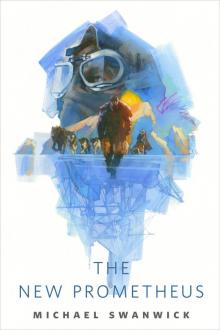 The New Prometheus
The New Prometheus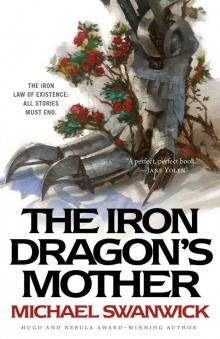 The Iron Dragon’s Mother
The Iron Dragon’s Mother The Mongolian Wizard Stories
The Mongolian Wizard Stories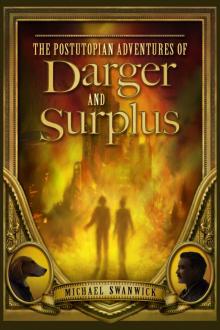 The Postutopian Adventures of Darger and Surplus
The Postutopian Adventures of Darger and Surplus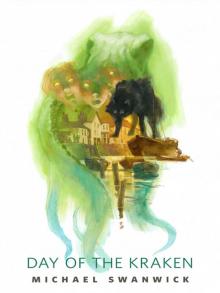 Day of the Kraken
Day of the Kraken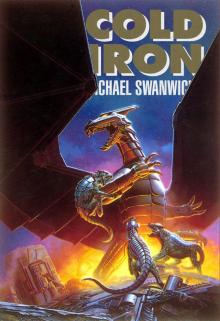 Cold Iron
Cold Iron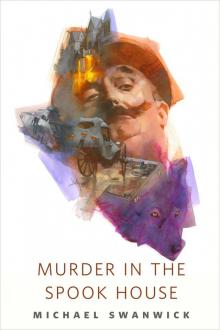 Murder in the Spook House: A Tor.com Original
Murder in the Spook House: A Tor.com Original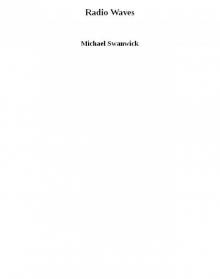 Radio Waves
Radio Waves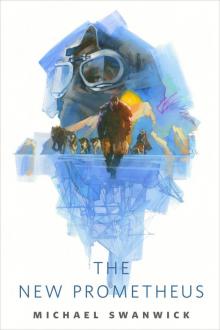 The New Prometheus: A Tor.com Original
The New Prometheus: A Tor.com Original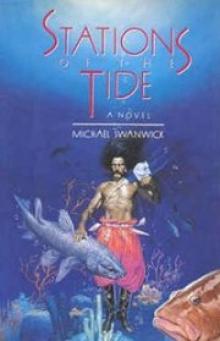 Stations of the Tide
Stations of the Tide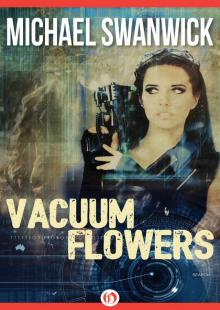 Vacuum Flowers
Vacuum Flowers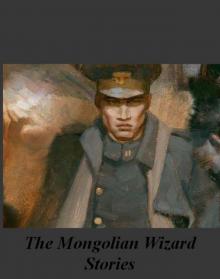 The Mongolian Wizard Stories (online stories 1-7)
The Mongolian Wizard Stories (online stories 1-7)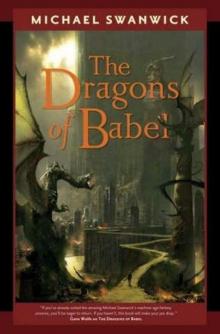 The Dragons of Babel
The Dragons of Babel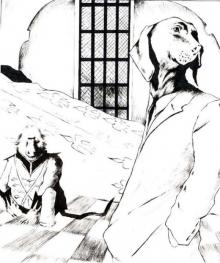 The Dog Said Bow-Wow
The Dog Said Bow-Wow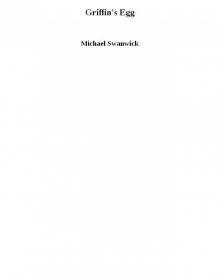 Griffin's Egg
Griffin's Egg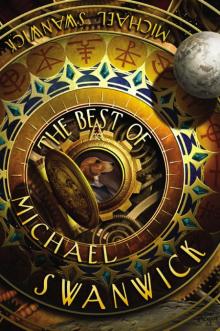 The Best of Michael Swanwick
The Best of Michael Swanwick Not So Much, Said the Cat
Not So Much, Said the Cat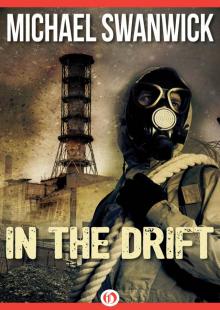 In the Drift
In the Drift Vacumn Flowers
Vacumn Flowers Slow Life
Slow Life The Wisdom Of Old Earth
The Wisdom Of Old Earth Legions In Time
Legions In Time Scherzo with Tyrannosaur
Scherzo with Tyrannosaur The Year's Best Science Fiction (2008 Edition)
The Year's Best Science Fiction (2008 Edition)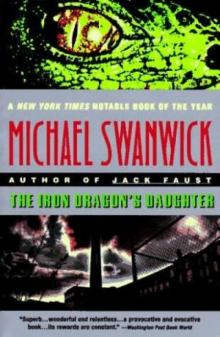 The Iron Dragon's Daughter
The Iron Dragon's Daughter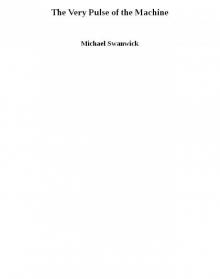 The Very Pulse of the Machine
The Very Pulse of the Machine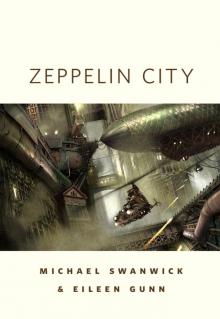 Zeppelin City
Zeppelin City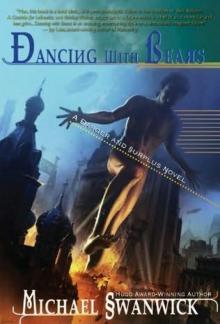 Dancing with Bears
Dancing with Bears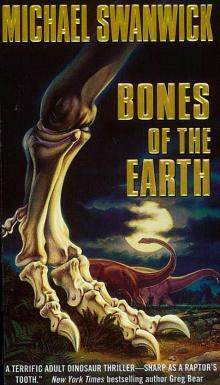 Bones of the Earth
Bones of the Earth Tales of Old Earth
Tales of Old Earth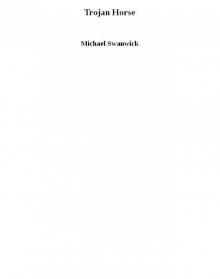 Trojan Horse
Trojan Horse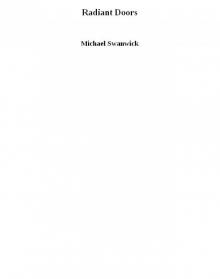 Radiant Doors
Radiant Doors